陋室铭之英文翻译
刘禹锡陋室铭英文翻译及详细解析
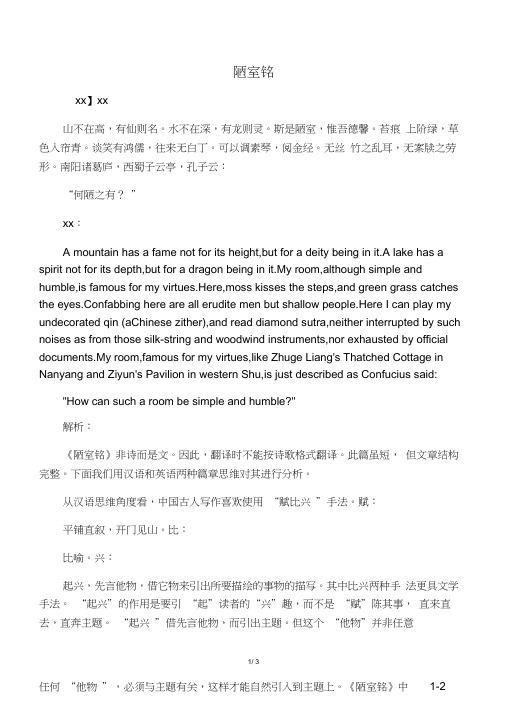
陋室铭xx】xx山不在高,有仙则名。
水不在深,有龙则灵。
斯是陋室,惟吾德馨。
苔痕上阶绿,草色入帘青。
谈笑有鸿儒,往来无白丁。
可以调素琴,阅金经。
无丝竹之乱耳,无案牍之劳形。
南阳诸葛庐,西蜀子云亭,孔子云:“何陋之有?”xx:A mountain has a fame not for its height,but for a deity being in it.A lake has a spirit not for its depth,but for a dragon being in it.My room,although simple and humble,is famous for my virtues.Here,moss kisses the steps,and green grass catches the eyes.Confabbing here are all erudite men but shallow people.Here I can play my undecorated qin (aChinese zither),and read diamond sutra,neither interrupted by such noises as from those silk-string and woodwind instruments,nor exhausted by official documents.My room,famous for my virtues,like Zhuge Liang's Thatched Cottage in Nanyang and Ziyun's Pavilion in western Shu,is just described as Confucius said:"How can such a room be simple and humble?"解析:《陋室铭》非诗而是文。
【2018最新】陋室铭英文翻译及赏析word版本 (4页)

本文部分内容来自网络整理,本司不为其真实性负责,如有异议或侵权请及时联系,本司将立即删除!== 本文为word格式,下载后可方便编辑和修改! ==陋室铭英文翻译及赏析陋室铭》是这首铭文作为经典流传至今,不仅因其思想内容积极乐观,境界高远,其语言上的特色上的独特魅力也是不容忽视的。
下面由小编为大家精心收集的陋室铭英文翻译及赏析,希望可以帮到大家!山不在高,有仙则名。
水不在深,有龙则灵。
斯是陋室,惟吾德馨。
苔痕上阶绿,草色入帘青。
谈笑有鸿儒,往来无白丁。
可以调素琴,阅金经。
无丝竹之乱耳,无案牍之劳形。
南阳诸葛庐,西蜀子云亭。
孔子云:“何陋之有?”注释⑴ 在:在于,动词。
⑵ 名:出名,著名,因--而著名,名词作动词。
⑶ 灵:显得有灵气,名词作动词。
⑷ 斯是陋室:这是简陋的屋子。
斯:此,这。
是:表判断。
陋室:简陋的屋子。
⑸ 惟吾德馨:只是我(住屋的人)的品德高尚(就不感到简陋了)惟:只。
吾:我,这里指住屋的人自己。
馨:香气,这里指品德高尚。
(6)上:动词,长到,蔓到。
⑺ 鸿儒:即大学问家,这里指博学而又品德高尚的人。
鸿:大。
儒:旧指读书人。
⑻ 白丁:平民,这里指没有什么学问的人。
⑼调素琴:弹奏不加装饰的琴。
调:调弄,这里指弹(琴)。
素琴:不加装饰的古琴。
⑽金经:指用泥金书写的佛经。
即《金刚经》。
⑾丝竹:指琴瑟、箫管等乐器,这里指奏乐的声音。
“丝”指弦乐器,“竹”指管乐器。
这里指音乐。
⑿之:助词,不译。
用在主谓间,取消句子的独立性。
⒀乱耳:扰乱双耳。
乱:形容词的使动用法,使……乱,扰乱。
⒁案牍(dú):官府的公文。
⒂劳形:使身体劳累(使动用法)。
劳:形容词的使动用法,使……劳累。
形:形体、身体。
⒃南阳:地名,今河南省南阳市西。
诸葛亮在出山之前,曾在南阳卧龙岗中隐居躬耕。
⒄南阳诸葛庐,西蜀子云亭:南阳有诸葛亮的草庐,西蜀有扬子云的亭子。
这两句是说,诸葛庐和子云亭都很简陋,因为居住的人很有名,所以受到人们的景仰。
【参考文档】陋室铭英文翻译及赏析-范文模板 (4页)
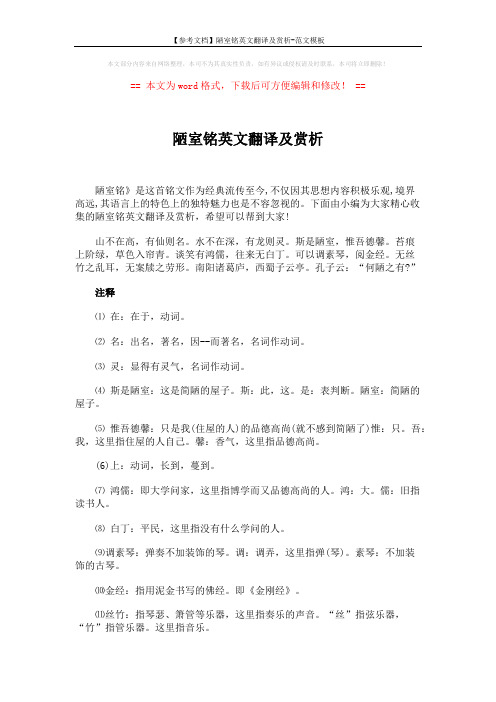
本文部分内容来自网络整理,本司不为其真实性负责,如有异议或侵权请及时联系,本司将立即删除!== 本文为word格式,下载后可方便编辑和修改! ==陋室铭英文翻译及赏析陋室铭》是这首铭文作为经典流传至今,不仅因其思想内容积极乐观,境界高远,其语言上的特色上的独特魅力也是不容忽视的。
下面由小编为大家精心收集的陋室铭英文翻译及赏析,希望可以帮到大家!山不在高,有仙则名。
水不在深,有龙则灵。
斯是陋室,惟吾德馨。
苔痕上阶绿,草色入帘青。
谈笑有鸿儒,往来无白丁。
可以调素琴,阅金经。
无丝竹之乱耳,无案牍之劳形。
南阳诸葛庐,西蜀子云亭。
孔子云:“何陋之有?”注释⑴ 在:在于,动词。
⑵ 名:出名,著名,因--而著名,名词作动词。
⑶ 灵:显得有灵气,名词作动词。
⑷ 斯是陋室:这是简陋的屋子。
斯:此,这。
是:表判断。
陋室:简陋的屋子。
⑸ 惟吾德馨:只是我(住屋的人)的品德高尚(就不感到简陋了)惟:只。
吾:我,这里指住屋的人自己。
馨:香气,这里指品德高尚。
(6)上:动词,长到,蔓到。
⑺ 鸿儒:即大学问家,这里指博学而又品德高尚的人。
鸿:大。
儒:旧指读书人。
⑻ 白丁:平民,这里指没有什么学问的人。
⑼调素琴:弹奏不加装饰的琴。
调:调弄,这里指弹(琴)。
素琴:不加装饰的古琴。
⑽金经:指用泥金书写的佛经。
即《金刚经》。
⑾丝竹:指琴瑟、箫管等乐器,这里指奏乐的声音。
“丝”指弦乐器,“竹”指管乐器。
这里指音乐。
⑿之:助词,不译。
用在主谓间,取消句子的独立性。
⒀乱耳:扰乱双耳。
乱:形容词的使动用法,使……乱,扰乱。
⒁案牍(dú):官府的公文。
⒂劳形:使身体劳累(使动用法)。
劳:形容词的使动用法,使……劳累。
形:形体、身体。
⒃南阳:地名,今河南省南阳市西。
诸葛亮在出山之前,曾在南阳卧龙岗中隐居躬耕。
⒄南阳诸葛庐,西蜀子云亭:南阳有诸葛亮的草庐,西蜀有扬子云的亭子。
这两句是说,诸葛庐和子云亭都很简陋,因为居住的人很有名,所以受到人们的景仰。
刘禹锡陋室铭英文翻译及详细解析

陋室铭【唐】刘禹锡山不在高,有仙则名。
水不在深,有龙则灵。
斯是陋室,惟吾德馨。
苔痕上阶绿,草色入帘青。
谈笑有鸿儒,往来无白丁。
可以调素琴,阅金经。
无丝竹之乱耳,无案牍之劳形。
南阳诸葛庐,西蜀子云亭,孔子云:“何陋之有?”英译:A mountain has a fame not for its height, but for a deity being in it. A lake has a spirit not for its depth, but for a dragon being in it. My room, although simple and humble, is famous for my vir tues. Here, moss kisses the steps, and green grass catches the eyes. Confabbing here are all eru dite men but shallow people. Here I can play my undecorated qin (a Chinese zither), and read dia mond sutra, neither interrupted by such noises as from those silk-string and woodwind instrument s, nor exhausted by official documents. My room, famous for my virtues, like Zhuge Liang's Thatc hed Cottage in Nanyang and Ziyun's Pavilion in western Shu, is just described as Confucius said:" How can such a room be simple and humble?"解析:《陋室铭》非诗而是文。
陋室铭全文解释及译文
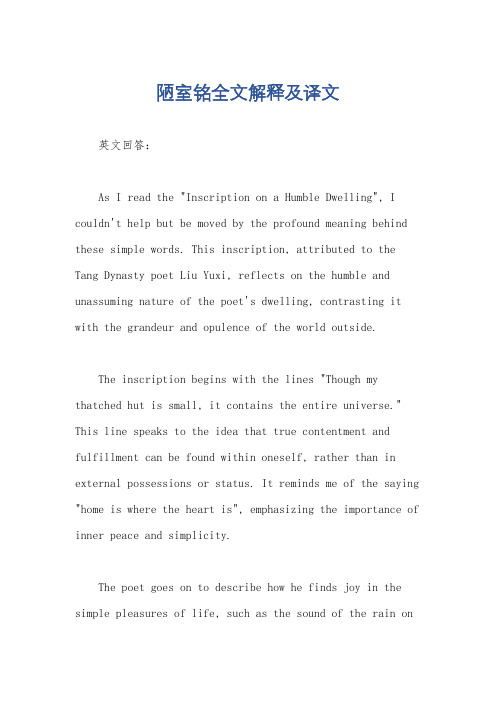
陋室铭全文解释及译文英文回答:As I read the "Inscription on a Humble Dwelling", I couldn't help but be moved by the profound meaning behind these simple words. This inscription, attributed to the Tang Dynasty poet Liu Yuxi, reflects on the humble and unassuming nature of the poet's dwelling, contrasting it with the grandeur and opulence of the world outside.The inscription begins with the lines "Though my thatched hut is small, it contains the entire universe." This line speaks to the idea that true contentment and fulfillment can be found within oneself, rather than in external possessions or status. It reminds me of the saying "home is where the heart is", emphasizing the importance of inner peace and simplicity.The poet goes on to describe how he finds joy in the simple pleasures of life, such as the sound of the rain onhis roof or the view of the mountains in the distance. He finds beauty in the mundane and the everyday, showing that one does not need extravagant luxuries to find happiness.One of my favorite lines in the inscription is "I mend my clothes among the remnants of the clouds." This image of the poet sewing his clothes amidst the clouds evokes asense of harmony with nature and a connection to the world around him. It reminds me of the importance of beingmindful and present in the moment, finding beauty in the small details of life.Overall, the "Inscription on a Humble Dwelling" is a powerful reminder of the value of simplicity, humility, and gratitude. It encourages us to appreciate the beauty in the ordinary and to find contentment within ourselves, rather than in external wealth or status.中文回答:读完“陋室铭”,我深受这些简单文字背后的深刻含义所感动。
刘禹锡陋室铭英文翻译及详细解析
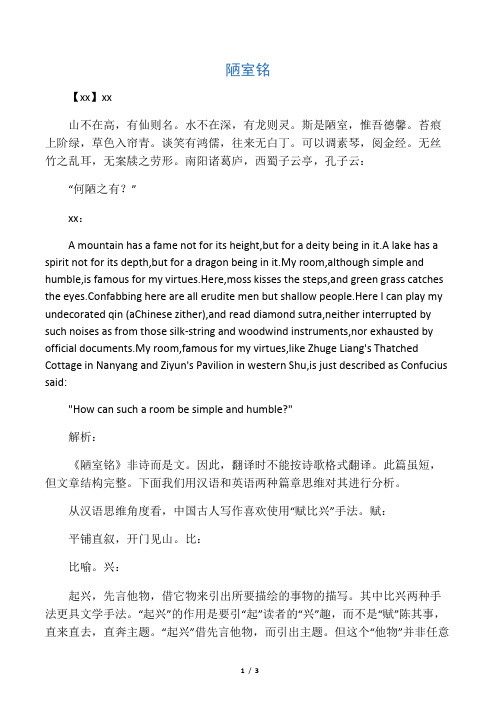
陋室铭【xx】xx山不在高,有仙则名。
水不在深,有龙则灵。
斯是陋室,惟吾德馨。
苔痕上阶绿,草色入帘青。
谈笑有鸿儒,往来无白丁。
可以调素琴,阅金经。
无丝竹之乱耳,无案牍之劳形。
南阳诸葛庐,西蜀子云亭,孔子云:“何陋之有?”xx:A mountain has a fame not for its height,but for a deity being in it.A lake has a spirit not for its depth,but for a dragon being in it.My room,although simple and humble,is famous for my virtues.Here,moss kisses the steps,and green grass catches the eyes.Confabbing here are all erudite men but shallow people.Here I can play my undecorated qin (aChinese zither),and read diamond sutra,neither interrupted by such noises as from those silk-string and woodwind instruments,nor exhausted by official documents.My room,famous for my virtues,like Zhuge Liang's Thatched Cottage in Nanyang and Ziyun's Pavilion in western Shu,is just described as Confucius said:"How can such a room be simple and humble?"解析:《陋室铭》非诗而是文。
《陋室铭》英文翻译及赏析

《陋室铭》英文翻译及赏析陋室铭朝代:唐代作者:刘禹锡原文:山不在高,有仙则名。
水不在深,有龙则灵。
斯是陋室,惟吾德馨。
苔痕上阶绿,草色入帘青。
谈笑有鸿儒,往来无白丁。
可以调素琴,阅金经。
无丝竹之乱耳,无案牍之劳形。
南阳诸葛庐,西蜀子云亭。
孔子云:何陋之有?《陋室铭》英文翻译An Eulogium on a Humble CellLiu YuxiA mount needs not be high; it becomes noted when on it fairies dwell.A body of water needs not be deep; it would be ensouled, if a dragon makes it its resting whereabouts.This hut of mine is a humble one, but I make it virtuously fragrantin repute.The green moss creeping on the stepping stones and the verdure inthe courtyard peeing through the screen do tell the presence of spring.Here could be heard the table-talks and laughters of renowned scholars, but the rough and gross come not hither their wares to sell.Here plain table-heptachord could be plucked and golden classicsread the worldly cares to quell.But there are without riotous strings and pipes to confuse the ears, and tedious official documents to ring quietude’s knell.Zhuge’s recluse cottage at Nanyang and Yang Xiong’s hermit arbo ur in West Shu, –according to Confucius, wherefore could either one of them be branded as a humble cell?《陋室铭》译文《陋室铭》注释⑴陋室:简陋的屋子。
陋室铭翻
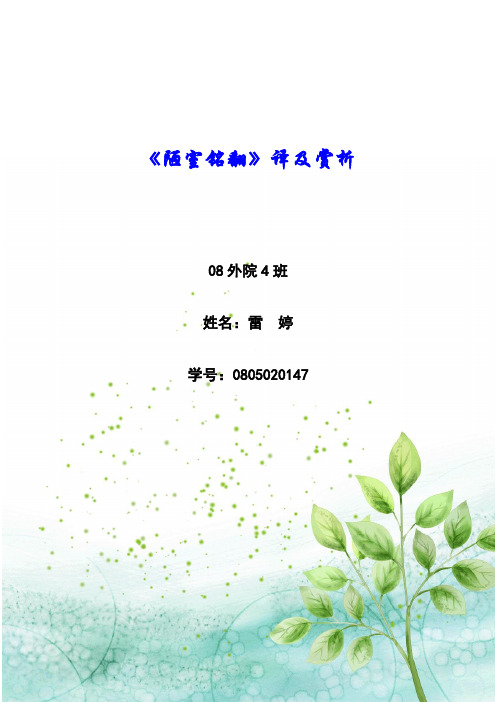
《陋室铭翻》译及赏析08外院4班姓名:雷婷学号:0805020147An Epigraph of My Humble HomeIt doesn't matter how hight the mountain is,It is the celestial being who make it famous.It doesn't matter how deep the lake is,It is the dragon who give it magical power.It doesn't matter how humble my home is,It is my virtues which make it sweet.The moss cover the stonesteps green by creeping,The grass turns the curtain blue by reflecting.I chat happily with learned scholars,But i have no interaction with illiterate persons.In this humble room,I can enjoy playing the undecorated Qin ,Or reading precious Buddhist Scriptures.I can avoid the disturbance of unpleasant music coming into my ear, And get rid of the wearing reading of official documents.My home is just like the thatched cottage of Zhu Geliang in Nanyang, Or the pavilion of Zi Yun in Xishu.As confucius once said :"How could we call it a humble home ?"翻译体会翻译《陋室铭》时,首要任务就是要理解和弄清古文所表达的含义以及作者的主观态度是积极还是消极的。
- 1、下载文档前请自行甄别文档内容的完整性,平台不提供额外的编辑、内容补充、找答案等附加服务。
- 2、"仅部分预览"的文档,不可在线预览部分如存在完整性等问题,可反馈申请退款(可完整预览的文档不适用该条件!)。
- 3、如文档侵犯您的权益,请联系客服反馈,我们会尽快为您处理(人工客服工作时间:9:00-18:30)。
Inscription of My Shack
①A hill can get a great fame with an immortal living in it, despite of its height; a lake can gain a good reputation with a dragon lurking in it, despite of its depth. ②Although it is just a shack, one would not be aware of its simplicity because of my noble character. ③Green moss grows onto my stone steps, the verdant color of grass leaps into my door. ④All of the men chatting and laughing here are of wide erudition, none of the men contacting with me are of little learning. ⑤In my shack, I can play my undecorated Guqin (a seven-stringed plucked instrument), I can also read my treasured books. ⑥No mundane music would disturb my ears; no official documents would exhaust me (my body). ⑦This shack is similar to both Zhuge Liang’s thatched cottage in Nan Yan and Yang Ziyun’s pavilion in Xi Shu. ⑧Just like what Confucius said, ‘with a gentlemen living in it, how can one call it simple?’
在做这篇翻译的时候,我用到的句子都比较对称,因为我注意到原文的句子有对称的特点。
我认为以我自己的水平难以翻出原文的古典美,所以索性就用比较通俗浅显的词语来尽量表达出我对原文的理解,有些词的翻译也只是从网络或字典上查找到的,难免会有用词不恰当的地方。
标题《陋室铭》的翻译,主要考虑两点,一是陋室,二是铭。
选用shack作为陋室的翻译原因有二:1.shack的英文解释——a small building that has not been built very well与我对“陋室”的理解比较吻合,陋室就是简陋的屋子,虽然简陋但是其功能是完整的。
2.shack 是单音节词,短小简洁,和古文言简意赅的风格是相符的。
“铭”最初是刻在器物,碑碣上的文字,后来逐步形成一种文体。
表示“铭刻”意思的动词有inscribe和engrave,但是这里要用名词形式,所以选用了inscription(铭文),engraving虽然是名词形式,但是意思是雕刻术或雕版印刷品等与雕刻有关的意思。
第一句翻译关键在于“名”和“灵”的翻译,我认为这两个字都是名词动用,所以在翻译中用了两个动词短语。
“名”和“灵”的意思也是相近的,都是获得美好的名声或变得有名气的意思,所以翻译的时候选用了fame和reputation两个词。
第二句在翻译中,最初选用tatt ie ness,也就是tatty的名词来翻译“简陋”,后来才察觉tatty显得非常不正式,所以改用了simple的名词形式simplicity。
我认为陋室是简洁朴素的,所以用simplicity很合适。
第四句翻译中,“鸿儒”和“白丁”是一对反义词,因为不知如何表达这两个词,所以将原文里的名词在翻译中用表语的形式表现出来,并用all与none和wide与little来形成反差。
第五句翻译中,“素琴”的翻译我选用的是undecorated Guqin,“素”就是质朴的,没有过多装饰的意思,所以我用了undecorated,而“琴”选用“古琴”的汉语拼音是因为我认为古琴是中国传统文化中独有的一种乐器,英语中没有词能与之对应,所以就用了Guqin,并在后面的括号里简要的解释古琴是什么。
对于“金经”的理解有两种,一种是经文,一种是典藏的书籍。
根据以往的学习和对刘禹锡的了解,他对经文似乎没什么研究,所以我选用第二种释义,即典藏的书籍。
Treasure作为名词有“珍宝,珍品”的意思,作为动词有“珍藏”的意思,可以准确的表现出作者刘禹锡热爱书籍的情感。
第七句之所以这样翻译,是因为我对与原文的理解是这样的:作者想要将他的陋室与诸葛亮的茅庐和扬子云的旧居媲美,三者之间必然有相似之处。
最后一句的翻译与第一句的翻译想呼应,都用到了with短语表示伴随,起修饰作用。
